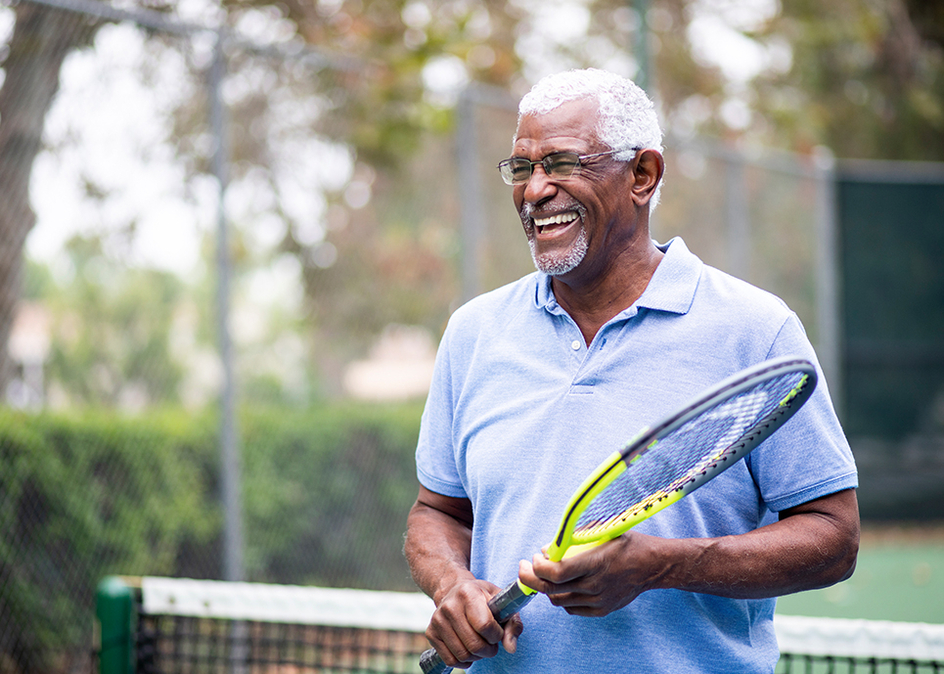
Bret “The Hitman” Hart, the former professional wrestler and Canadian Hall of Famer, can still vividly recall the long, painful months of recovery after his stroke in 2002. A March of Dimes spokesperson, Hart is passionate about raising stroke awareness. After all, stroke is the fifth leading cause of death in Canada, after cancer, heart disease, dementia and chronic obstructive pulmonary disease (COPD). Almost 10 percent of Canadian seniors over 65 had a stroke in 2016, for example. So read on to learn about stroke symptoms, different types of strokes, risk factors and how seniors can reduce their risk of stroke, as well as stroke recovery tips.
“Hands down, recovering from stroke was one of the most challenging battles I ever had,” says Hart, who encourages survivors to stay strong. “Don’t give up. All the little steps add up. You have to stay focused on your recovery. It’s like trying to win a gold medal: you have to do what it takes to win.”
Watch the recent webinar in which Hart shares his stroke experience and recovery advice. Kristen Southon, a Life Enrichment Coordinator at Amica Georgetown, also offers cognitive and physical exercise tips for seniors.
What is a stroke?
Blood supplies nutrients and oxygen to the brain. A stroke occurs when blood flow to any part of the brain stops, causing brain cell damage. The extent of the damage depends on which part of the brain is impacted and how long the brain cells go without oxygen. That’s why stroke survivors may have trouble thinking, speaking or moving after a stroke.
Signs of a stroke
Heart & Stroke Canada and other organizations use the FAST acronym to ensure people identify stroke symptoms and call 9-1-1 immediately. Quick treatment could save a life or limit the stroke’s impact.
Face is it drooping?
Arms can you raise both?
Speech is it slurred or jumbled?
Time to call 9-1-1 right away.
Other signs of stroke include:
- Sudden weakness, numbness, tingling or loss of movement in your leg, arm or face, particularly if it’s on one side of your body only;
- Sudden vision changes or double vision in one or both eyes;
- Sudden confusion, including difficulty speaking and understanding other people;
- Sudden issues with dizziness, balance, coordination or walking;
- A sudden severe and unusual headache; and
- Drowsiness, nausea or vomiting.
What are the causes of stroke?
The two types of stroke are defined by how blood is prevented from reaching the brain:
- An ischemic stroke happens when a blood clot or blockage — caused by fatty deposits that narrow blood vessels — stops blood flow to a part of the brain.
- A hemorrhagic stroke occurs when a diseased or weakened blood vessel ruptures in your brain, disrupting blood flow.
What is a “mini-stroke?”
What people call a “warning stroke” or a “mini-stroke” is actually a transient ischemic attack (TIA) triggered by a small clot briefly blocking an artery. Mini-stroke symptoms are the same as stroke symptoms, but they only last for a few minutes or up to 24 hours. Call 9-1-1 if you or someone else has stroke symptoms, as a mini-stroke may indicate that a major stroke is imminent.
What are the differences and similarities between a stroke and a heart attack?
Heart attacks and strokes are both medical emergencies that can occur suddenly and require immediate treatment. Heart attacks involve damage to the heart muscle, potentially triggered by a blocked coronary artery or heart arrhythmia, whereas strokes damage the brain. However, there are many shared or similar lifestyle-related risk factors and risk reduction tactics for stroke and heart disease.
How to reduce stroke risk
While there are some stroke risk factors that you can’t control, such as your age, family history, or ethnicity, Heart & Stroke Canada notes that the following healthy lifestyle choices can lower your stroke risk.
- Eat well and maintain a healthy weight. A low-salt diet rich in vegetables, fruits, whole grains and lean proteins will help lower your likelihood of hypertension, high cholesterol, obesity, diabetes, stroke and heart disease. Discover the best foods to eat (and ones to avoid), as well as the benefits of drinking water, in our dietary guide for seniors and our article on eating for cardiovascular health.
- Get moving. Regular exercise lowers your risk of stroke, heart disease, diabetes, dementia and cancer. Find exercises, physical activities and tips in our articles, Indoor fitness for seniors and A free workout for seniors.
- Quit smoking and binge drinking. Cigarettes and heavy drinking significantly boost your chances of stroke, heart disease, dementia and other ailments. Talk to your health practitioner for support to quit.
- Manage stress. Prolonged or elevated levels of stress can raise your blood pressure, bad cholesterol levels and stroke risk. Consider The best meditation videos podcasts and apps for seniors.
- Review your medication and drug use. Prescription medications that contain estrogen and recreational drugs such as cannabis, amphetamines and opioids can increase the possibility of stroke, so have a candid conversation with your doctor.
Factors that put you at higher stroke risk
The factors below may make you more susceptible to stroke than others, however you can still control your diet and other lifestyle choices to improve your health.
- Age. Stroke risk increases as you get older, and seniors over 85 are particularly vulnerable.
- Sex. Strokes impact women harder. Menopausal and elderly women are more likely to have strokes than their male counterparts and outcomes are more severe.
- Family history. Find out if your mother, father or other close relatives have had a mini-strokes (TIA) or strokes (especially at an early age), as this might raise your risk.
- Heritage. People of South Asian, African, First Nations, Metis and Inuit background are more likely to have diabetes, high blood pressure and a higher stroke risk.
- Medical conditions. Talk to your health care team about treatment and stroke risk if you or a loved one have high blood pressure, heart disease, high cholesterol, hardening of the arteries, diabetes, atrial fibrillation or vascular cognitive impairment.
Stroke treatment and recovery
Getting to the hospital within one or a few hours of having a stroke can facilitate immediate treatment or surgery to help minimize brain damage. During the first few days after a stroke, hospital staff will be assessing damage, providing treatment, examining how to stave off another stroke and identifying potential rehabilitation needs. Every person’s stroke recovery is unique, lasting months for some and years for others. It can be a significant load on caregivers. According to the March of Dimes Canada, more than half of Canadian stroke survivors need some assistance with daily activities during recovery.
“At Amica, we work with many stroke survivors, focusing on activities that get them moving and boost cognitive fitness,” says Southon. “Meditation, music therapy, playing games like Scattergories or Boggle, knitting and doing exercises like Yoga and Tai Chi are all beneficial.”
Assisted Living and Memory Care at Amica allows stroke survivors and other seniors to live well with personalized, professional care, 24/7 nursing support and engaging fitness programs and social activities. As needs change, we can offer two-person transfers, spa tubs, mechanical and hydraulic lifts and even palliative care.
Activities to rebuild strength and fine motor skills
Southon recommends these easy pursuits:
- Walking
- Gentle exercise
- Gentle yoga
- Gentle Tai Chi
- Gardening
- Knitting
- Playing an instrument
- Writing.
Cognitive activities to stimulate your brain
Southon encourages the following:
- Listening to a podcast or watching a documentary
- Meditation
- Listening to music
- Playing word, trivia and card games
- Doing puzzles
- Music therapy
- Playing chess or checkers.
Keep putting in the work to recover
“During my stroke recovery, I did whatever the experts told me to do, even when I felt frustrated, vulnerable or frail,” says Hart. “But what really lit a fire under me was a call from Walter Gretzky. When I suffered my stroke, he called me during the early days and said, ‘Don't feel defeated or sorry for yourself. Shake all that off, push forward and don’t give up.’ That advice made such a difference for me.”
Book a virtual or in-person tour to find out what it’s like to enjoy living on your own terms in an elegant Amica residence with outstanding dining, amenities, activities, senior care and safety measures.
